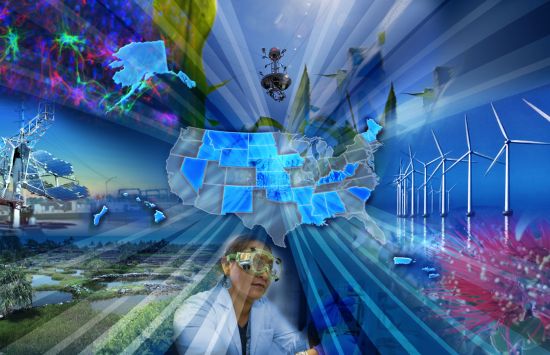About NSF EPSCoR
The U.S. National Science Foundation's EPSCoR program pursues a mission to enhance the research competitiveness of targeted jurisdictions (state, territory or commonwealth) by strengthening science, technology, engineering and mathematics (STEM) capacity and capability through a diverse portfolio of investments from talent development to local infrastructure. The EPSCoR program envisions its jurisdictions as recognized contributors to the national and global STEM research enterprise. The program seeks to:
- Catalyze the development of research capabilities and the creation of new knowledge that expands jurisdictions’ contributions to scientific discovery, innovation, learning, and knowledge-based prosperity
- Establish sustainable STEM education, training, and professional development pathways that advance jurisdiction-identified research areas and workforce development
- Broaden direct participation of diverse individuals, institutions, and organizations in the project’s science and engineering research and education initiatives
- Effect sustainable engagement of project participants and partners, the jurisdiction, the national research community, and the general public through data-sharing, communication, outreach, and dissemination
- Impact research, education, and economic development beyond the project at academic, government, and private sector levels.
EPSCoR is part of NSF's Broadening Participation portfolio.
Impacts and outcomes
NSF EPSCoR has impacted researchers across the nation. In 2023, the program's RII awardees have accomplished the following:
- Published 1,259 journal articles, book chapters, and related research material
- Received 611 grants, totaling over $460M, in additional research funding
- Patented 9 discoveries, with an added 49 patent-pending
- Helped 386 undergraduates and 251 graduate students earn their STEM bachelors and masters degrees
Learn more about EPSCoR's impact on the Impacts and Outcomes webpage.
Recent news
Read EPSCoR's new Dear Colleague Letter to learn more about Planning Grants for E-RISE and E-CORE.
More about EPSCoR

Investment strategies
Learn about EPSCoR's three major investment strategies to improve the R&D competitiveness of researchers and institutions within EPSCoR jurisdictions.

Criteria for eligibility
Find out more about who is eligible for EPSCoR funding.

EPSCoR impacts and outcomes
Since 1979, NSF EPSCoR has served its community through investment across the STEM enterprise.



